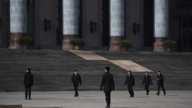【新唐人2013年11月14日訊】隨著中共十八屆三中全會閉幕,會議公告緊接著宣佈,中共當局將重點關注七項改革決定,其中設立「國家安全委員會」,特別引發外界關注。有分析指出,中共黨魁習近平通過設立「國家安全委員會」,將高層實權收回到自己手中,正式改變了前中共黨魁江澤民為垂簾聽政而設立的常委分權制,江派「第二權力中央」政法委,被徹底解體。
被外界稱為如地下黨般秘密召開的中共三中全會,12號終於閉幕了。會議公報摘要宣稱,中共中央將成立「全面深化改革領導小組」,並設立「國家安全委員會」,完善國家安全體制和國家安全戰略,確保國家安全。
有分析指出,中共成立「國家安全委員會」的目地,是因為中共黨魁習近平非常需要一個國安幕僚機構,可以直接提供整合國防、外交、反恐、維穩等重大事務的能力與建議。
時事評論家橫河:「原來政法委至少在名義上是黨的系統,現在成立國家安全委員會,就想冒用國家的名義了,但是實際上因為是黨的三中全會決定的,所以這個以國家名義出面的委員會,實際上還是黨的委員會,因此與其說是它要保護國家的安全,還不如說它要保護中共的統治。」
另有分析指出,習、李變革在力保中共統治的前提下,與前黨魁江澤民集團短兵相接,三中全會後,中共將進入全面公開廝殺的狀態,中央和地方諸侯、江派和習近平陣營的衝突將日趨白日化。
時事評論員夏小強:「江澤民下臺前,把最高層權力,分散到各個中共政治局常委的手中,以此來制約胡錦濤和溫家寶,繼續維持自己垂簾聽政的角色,這次三中全會,習近平通過設立國家安全委員會,和中央全面深化改革領導小組,這兩個高層權力機構,把高層實權收回到自己手中。正式改變了江澤民設置的常委分權制的高層權力結構,江派第二權力中央被解體。」
時事評論員夏小強指出,江澤民通過「政法委」控制中國的公安、法院、檢察院、國安、武裝警察系統,實際上是另一個「中央權力中心」。而為了迫害鎮壓法輪功成立的「610」秘密機構,也能隨時調動中國外交、教育、司法、國務院、軍隊、衛生等資源。
1999年6月10號,江澤民在政法委的基礎上,成立了一個專門處理法輪功問題的領導小組辦公室,簡稱「610」(辦公室),專門用於打壓法輪功。
外界評論,這個法外授權的臨時性組織「610」,如文革時期的「中央文革小組」。而「610」從根本上徹底逆轉了前中共領導人胡耀邦、趙紫陽和喬石等在「文革後」對民主和法制的努力,也將中共的「法治」倒退為江澤民一人獨裁的「人治」。
夏小強:「中共此次所組建的國安委,將負責情報、軍隊、外交、公安等任務,正在取代江派政法委的作用。因為從江澤民掌權時代起,政法委書記高調成為政治局常委,一直延續到習近平上臺。」
夏小強指出,從中央到地方的政法委書記,一般都同時兼任當地「610」辦公室負責人,這樣一來,中央分管政法委的政治局常委的實權,比其他常委都重要。而江系為了避免因迫害法輪功遭到大清算,最大的舉動就是緊抓「中央政法委書記」這個位置不放。
中共十八大前夕,江澤民以及緊跟江迫害法輪功的急先鋒——前中共中央政法委書記周永康,計劃將「第二權力中央」的繼承人——前重慶市委書記薄熙來,推進中共最高權力層,並策劃2014年通過政變,讓薄熙來替代習近平。這一計劃,被前重慶市公安局長王立軍打破。王立軍去年(2012年)年末,夜逃美領館尋求美國政治庇護,雖以失敗告終,卻令薄熙來下臺受審。
採訪編輯/常春 後製/李勇
The State Security Committee Signals Dismissal of
Politics and Law Commission
The communiqué following the closing of the Third Plenary
Session discloses the major issues concerning
comprehensively deepening reforms.
Among them, the decision to set up a state security committee
has drawn much concern.
Some analysts say that Xi Jinping is retrieving the central
power through this state security committee.
It will officially dismiss the current status of
decentralization by the Jiang Zemin faction in the Politburo
standing committee, i.e., the Politics and Law Commission.
The Third Plenum, labeled as an underground party gathering,
concluded on the 12th.
The communiqué declares that the CPC will set up a central
leading team for “comprehensively deepening reform".
The country will establish a state security committee,
improving systems and strategies to ensure national security.
The purpose of the state security committee has been analyzed,
to enable Xi Jinping to establish his authority in direct
integration of defense, foreign affairs, anti-terrorism,
and stability maintenance.
Hen He, commentator: The Politics and Law Commission is
a nominal party system.
The state security committee is in the name of the country,
but it was decided upon, during the Third Plenum of
the Communist Party.
Therefore, the so-called state committees are
actually party committees.
Rather than defending the security of the nation
it is to defend the party’s ruling.
It was also analyzed, following the closing of the plenary,
while Xi and Li were insistent on adhering to the ruling of
the CCP, the conflict between the new leaders and
former leader, Jiang Zemin’s faction will step into an open
battlefield with both central and local powers involved.
Xia Xiaoqiang, Political commentator: Jiang Zemin
distributed central power to the standing committee of the
Politburo prior to his leaving office.
His role in the central committee was thus sustained through
controlling individual committees.
He was then able to restrict the authority of
Hu Jintao and Wen Jiabao.
In the Third Plenum, Xi Jinping retracts his authority through
the establishment of the state security committee and the
central leading team for “comprehensively deepening reform".
These decisions officially change the power decentralization
by the Politburo standing committee and
dismiss Jiang Zemin’s power center.
Political commentator Xia Xiaoqiang explains that
Jiang Zemin had manipulated the regime through his
central power, the Politics and Law Commission.
It has control over China’s public security, courts,
prosecutors, national security, and armed police system.
In particular, he established the “610 office", a security
agency to coordinate and execute the
persecution of Falun Gong.
This security agency’s power over-rides and is empowered
to mobilize other resources such as those in diplomacy,
education, justice, the State Council,
the military and health.
Upon Jiang Zemin’s order, the 610 Office was created
on 10th June, 1999.
It is the implementation arm of the Central Leading Group
on dealing with Falun Gong, headed by high-ranking members
of the Communist Party’s Politburo standing committee.
This temporary and non-judicially authorized organization
has been criticized to function similarly to the Cultural
Revolution Group during the Cultural Revolution.
The 610 office has completely reversed the efforts of former
communist leaders such as Hu Yaobang, Zhao Ziyang and
Qiao Shi in democracy movements and the rule of law after
the Cultural Revolution.
Jiang Zemin has turned the CCP regime into a complete
“rule of man" dictatorship.
Xia Xiaoqiang: This state security committee will replace
the Politics and Law Commission to oversee intelligence,
military, diplomacy, and public security.
Since Jiang Zemin’s era, the secretary of the Politics and Law
Commission has stepped up to become a Politburo
Standing Committee member.
Xia Xiaoqiang explains that the Secretary of the Politics and
Law Commission from the central to local government generally
serves as the head of the local 610 office.
Consequently, the Central Political and Law Commission
Secretary has overpowered the rest of the
Politburo standing committee.
Jiang Zemin’s faction, for fear of liquidation over the
persecution of Falun Gong, has to hold on to the power
and the position of the Secretary of the
Central Political and Law Commission.
Prior to the 18th National Congress, former Chongqing Party
Secretary Bo Xilai was the heir to Jiang Zemin’s central power,
the Central Political and Legal Committee.
The coup plan, organized by Jiang’s ally, Zhou Yongkang,
former Central Political and Legal Committee Secretary,
intended to have Bo replace Xi Jinping in 2014.
However, this plan was exposed through Wang Lijun’s
incident in 2012.
Bo Xilai was thus forced to step down and was put on trial.
Interview & Edit/ChangChun Post-production/LiYong



























